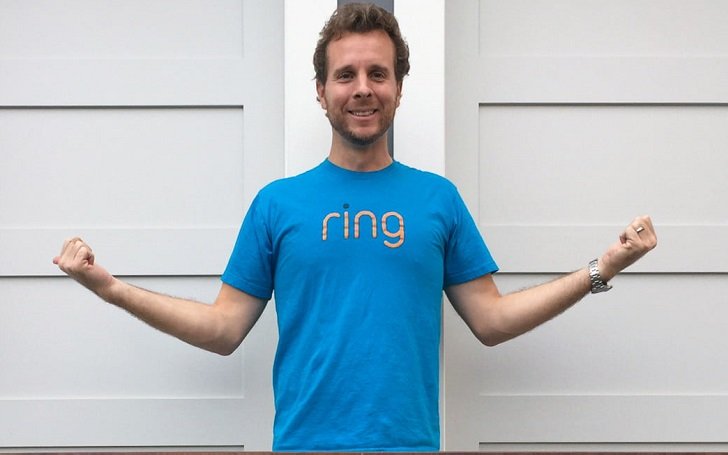Jamie Siminoff is the founder of the smart home and home security company Ring Inc., which he sold to Amazon for a price between $1.2 billion and $1.8 billion in February 2018. His success story comes after he was initially rejected multiple times on Shark Tank when he pitched his idea of the struggling start-up in 2013. Since then, they’ve been calling him back several times.
Born on October 18, 1976 [age 43], Chester, New Jersey, Jamie is a 1999 Bachelor’s Degree in Entrepreneurship graduate of Babson College and is a father to a son Oliver Siminoff (or sweetly Ollie), who suffered from Galactosemia at the time of birth. He married Oliver’s mother, Erin Lindsey Siminoff, on October 7, 2006.
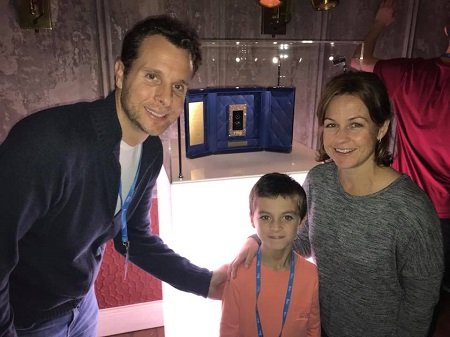 Jamie Siminoff with his wife, Erin Siminoff, and their son, Ollie.
Jamie Siminoff with his wife, Erin Siminoff, and their son, Ollie.
Photo from: James Siminoff, Facebook
Siminoff started his start-up company in his garage in Los Angeles in 2011. He was broke when he went to pitch on Shark Tank. After they rejected to invest in his idea, he was devastated but picked up the pieces to create a billion-dollar business. So of course, his net worth is pretty huge.
Jamie Siminoff Net Worth: $400 Million As of January 2020, Completely from ‘Ring’ — The Path
As of 2020, Ring founder and CEO Jamie Siminoff controls a net worth of $400 million. Considering he was broke when he pitched at Shark Tank, his source of income has been completely from his ownership of his groundbreaking startup, DoorBot. It was later renamed Ring after his failed pitch at the show. He sold portion of his ownership to Amazon for a billionaire price back in February 2019.
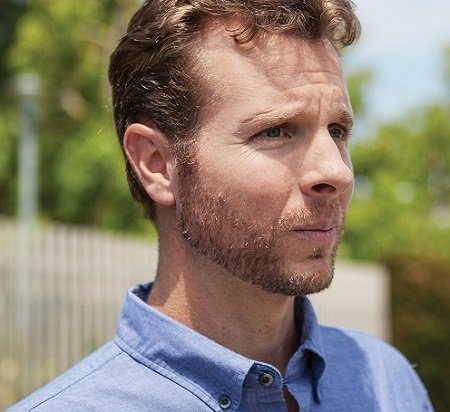 Jamie Siminoff’s net worth still increases as he continues being the CEO of ‘Ring’.
Jamie Siminoff’s net worth still increases as he continues being the CEO of ‘Ring’.
Photo Courtesy: Ring
When Jamie created DoorBot in 2013 for his garage, he knew what was his new money-making venture was (yes, there were more, below). He injected $364,000 into the company with the help of crowdfunding and was making $1 million sales per year before going to Shark Tank. Yes, he did make money. But bringing up an idea and ‘quickly’ turning it into a company was a real problem for him, he reminisces to Inc. Magazine.
In November 2013, he drove out of his garage and went on the show to ask for $700,000 in turn for a 10% investment in his company as he valued it at $7 million. The Sharks liked the idea, but he received four rejections. The 10% investment would’ve been worth $120 – $180 million today if it was accepted. He was, however, offered a $700,000 loan offer in exchange for 10% of sales until the loan was paid back, and a 7% slice of all sales after that, plus 5% equity in the company. Yes, it was complicated.
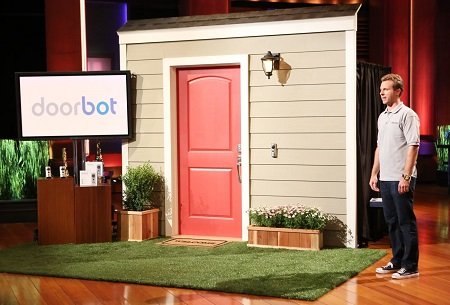 Jamie Siminoff went to ‘Shark Tank’ with the American Dream but returned devastated.
Jamie Siminoff went to ‘Shark Tank’ with the American Dream but returned devastated.
Photo: Adam Taylor, ABC/Shark Tank
You’d think he would readily take it considering he so badly needed the money. But he declined the offer and left home disappointed. It was fine, but there was also the possibility his segment wouldn’t air on the show. Luckily, he made it on TV. As he did, the DoorBot‘s sales spiked to “at least $5 million in additional sales” with $1 million in the first month of his appearance, estimated Siminoff. That’s also the cause of the name being changed to Ring. His product made it to Best Buy, Home Depot, and Target stores.
2015 to 2017 was a tough period for Jamie Siminoff. He’d be depressed and even cry in the middle of the night, but he picked himself up. “People used to ask me, ‘What would you do differently?’ I’d say, ‘Raising $100 million right off the bat would have been much better.’,” he told Inc. Magazine. They would kind of look at me like, ‘Why didn’t you?’ Well, I didn’t because nobody would give me a friggin’ $100 million. Someone else said to me, ‘I heard a fund pulled out of one of your rounds.’ A fund? Try 250 funds! I wish it had been one fund. Everybody pulled out of my rounds.”
Investors Pouring In – Leading Up to the Sale
But there were interests from investors after his sales spike. Virgin Group founder Sir Richard Branson, Goldman Sachs, and Qualcomm Ventures invested over around $200 million in the company. Branson himself injected a $28 million funding in 2015 that valued the organization at $60 million. He also took a funding interest in January 2017, which increased the organization’s absolute financing to $209 million, and The Wall Street Journal‘s valuation of Ring at the time was $460 million.
Watch: Jamie Siminoff Talks about Ring’s Path to Success
There were 1,300 representatives with the product being sold in 16,000 stores within four years for Jamie Siminoff. But in February 2018, it was announced that Ring was being sold to Amazon like it acquired Adidas and Audible and that he was “beyond happy”. The price was reported to be “over $1 billion.” He didn’t make early announcements before the transaction officially closed. To top it off, he went back to Shark Tank in October 2018, that time a guest shark. He was ready to give off money too.
However, the sale didn’t make him a billionaire in terms of net worth. Forbes reported at the time, “Ring has burned through multiple financing rounds, bringing its investment capital to $209 million and diluting Siminoff’s ownership stake to 10%. The Amazon deal voids a $300 million venture round Siminoff was set to close in March, which would have valued the company at $1 billion.”
Now, he is believed to own 20%-30% of Ring. Jamie Siminoff’s grossing lies somewhere between $360 million and $540 million before taxes. After taxes, his payout increased his net worth by around $180 million – $270 million.
So, What’s the DoorBot? (Here’s Why He Was Broke Before Going to ‘Shark Tank’)
The cellphone and the doorbell are connected by Wi-Fi; it’s that simple. Yeah, a $200 toy. That was the concern Siminoff had people would think like that. He first got the idea for a cell-phone connected doorbell after his wife Erin complained he wouldn’t hear the doorbell when she rang it. Just to make it clear, he’d already tried a lot of ideas before this (more on this later).
Wife Erin actually encouraged him to go forward with it and mass-produce it. She was working at 20th Century Fox at the time. A supporting wife indeed. He drained his bank account to produce a first shipment of 5,000 doorbells from a factory in Taiwan. Yes, that’s what made him broke. A self-made net worth after all.
An entrepreneur in May 2013 during lunch suggested Jamie Siminoff to pitch his idea on Shark Tank and gave him an email address for a producer who worked for the hit business pitch show. Yes, he obviously got a callback, and the rest is history.
It was pitched as a wifi-enabled video doorbell that synced to the user’s smartphone allowing them to see who was ringing their door in real-time. It was also equipped with a burglary-deterrent feature to allow users to pretend they were in the house when they actually weren’t.
Watch: Jamie Siminoff’s Pitch on ‘Shark Tank’
Despite the sale spike, it was still reviewed poorly for its poor picture quality, muffled sound and faulty Wi-Fi connection. Jamie Siminoff himself took the task of responding to complaints from customers in order to better his product. In March 2014, he struck a deal with Foxconn, the Chinese company that makes iPhones, “to collaborate on a redesign and extend a line of credit to cover the first 30,000 units at $100 apiece.”
While looking for funds, one of his investors, Hamet Watt of Upfront Ventures, suggested him to rename the company to Ring, and hence the name. He also bought the domain name, ring.com, from a domain-name squatter for $1 million from his increasing net worth. 2015 rolled in with the investment from Branson.
Now, about the burglary reduction thing. In 2016, Ring just gave away 40 doorbells in Wilshire Park, a middle-class L.A. neighborhood where home burglaries were already becoming something of a pest, in coordination with the LAPD. Despite the devices covering only 10% of the area’s homes, burglaries fell by 55% within six months, according to the LAPD. The product just mostly discouraged robbers to strike when they believe no one is home.
Jamie and an analyst at Imperial Capital, Saliq Khan, appeared in a video to praise a woman named Vicki for her viral Ring doorbell video showing her chasing off a would-be intruder commanding him to, “Get the f*** out of here!” Now Ring has offices in Buenos Aires, Taiwan, Europe, Australia and more. Oh, and Khan also had struck a deal for an equity stake in the company in 2016 for appearing in commercials with him like the one described earlier. A portion of his net worth to give out though.
Siminoff’s Other Ventures — EdisonJr.; Unsubscribe, Inc.; PhoneTag and More Achievements
It comes to no surprise that Ring expanded beyond doorbells after changing the name and bringing in more funds. Half its revenue comes from an array of motion-activated night-vision cameras equipped with video, speakers, LED lights and sirens. It helped Ring obtain a revenue of $415 million in 2017. That’s more than double the $170 million it earned in 2016.
The 43-year-old did make a million a year before even starting DoorBot. Why he changed his ideas? He was getting depressed as he believed, “Nothing I was doing was impacting the world in a meaningful way”.
He is the founder and CEO of the design laboratory, EdisonJr. Before that, Jamie Siminoff was the co-founder and CEO of Unsubscribe, Inc. It is a technology platform to stop unwanted email at the source. Before that, Jamie also founded PhoneTag, the first voicemail to text service in the U.S. It was his most successful company for his early net worth as struck a $17 million partnership DiTech in 2009 under the name SimulScribe.
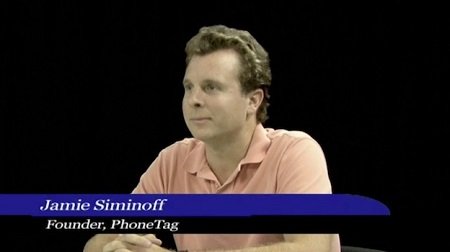 ‘PhoneTag’ wasn’t a fail either.
‘PhoneTag’ wasn’t a fail either.
Photo from: Clip from ‘This Week on Startups’
Before PhoneTag, Jamie Siminoff founded NobelBiz, a provider of telecommunications services to contact centers. He’s still an active advisor there. As for rewards, he was recognized as one of New York’s top six entrepreneurs by Crain’s Magazine in 2007 and Laptop Magazine‘s top ten mobile mavericks.
One of his former startups was also called BodyMint, a vitamin supplement containing chlorophyll that was supposed to eliminate body odor. But it failed miserably as it turned its customers’ stools green. Yeah, after a series of hit-and-miss ventures, Siminoff retreated to his Pacific Palisades garage with a couple of friends for new innovation. In the way, came the doorbell complain from his wife.
So it seems behind this man’s success, there really was a woman. Jamie Siminoff wife was someone that always believed in him for all these years, and he is thankful to have her by his side. And sure, the pair’s net worths are shared. Plus, his story must be an inspiration for wannabe billionaires as well.
There’s more to come from celeb$fortune for content regarding Celebrity Net Worths. Stay tuned and keep checking up.

